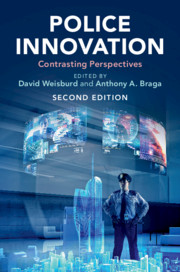Police Innovation
Contrasting Perspectives
Part of Cambridge Studies in Criminology
- Editors:
- David Weisburd, George Mason University, Virginia
- Anthony A. Braga, Harvard University, Massachusetts
- Date Published: May 2006
- availability: This ISBN is for an eBook version which is distributed on our behalf by a third party.
- format: Adobe eBook Reader
- isbn: 9780511189937
Find out more about Cambridge eBooks
Adobe eBook Reader
Looking for an inspection copy?
This title is not currently available for inspection. However, if you are interested in the title for your course we can consider offering an inspection copy. To register your interest please contact [email protected] providing details of the course you are teaching.
-
Over the last three decades American policing has gone through a period of significant change and innovation. In what is a relatively short historical time frame the police began to reconsider their fundamental mission, the nature of the core strategies of policing, and the character of their relationships with the communities that they serve. This volume brings together leading police scholars to examine eight major innovations which emerged during this period: community policing, broken windows policing, problem oriented policing, pulling levers policing, third party policing, hot spots policing, Compstat and evidence-based policing. Including advocates and critics of each of the eight police innovations, this comprehensive book assesses the evidence on impacts of police innovation on crime and public safety, the extent of the implementation of these new approaches in police departments, and the dilemmas these approaches have created for police management. This book will appeal to students, scholars and researchers.
Read more- Presents comprehensive coverage of major police innovations over the past two decades
- Top scholars write in each substantive area of police innovation
- No other book provides such an in-depth coverage of the strengths and weaknesss of new police strategies
Customer reviews
Not yet reviewed
Be the first to review
Review was not posted due to profanity
×Product details
- Date Published: May 2006
- format: Adobe eBook Reader
- isbn: 9780511189937
- contains: 4 b/w illus. 6 tables
- availability: This ISBN is for an eBook version which is distributed on our behalf by a third party.
Table of Contents
1. Introduction David Weisburd
Part I. Community Policing:
2. The promise of community policing Wesley G. Skogan
3. Community policing: a skeptical view Stephen Mastrofski
Part II. Broken Windows:
4. Of 'Broken Windows' criminology and criminal justice William H. Sousa and George L. Kelling
5. Incivilities reduction policing, zero tolerance, and the retreat from coproduction: weak foundations and strong pressures Ralph B. Taylor
Part III. Problem-Oriented Policing:
6. Science, values and problem-oriented policing: why problem-oriented policing? John E. Eck
7. Problem-oriented policing: the disconnect between principles and practice Anthony A. Braga and David Weisburd
Part IV. Pulling Levers Policing:
8. Old wine in new bottles: policing and the lessons of pulling levers David M. Kennedy
9. Partnership, accountability, and innovation: clarifying Boston's experience with pulling levers Anthony A. Braga and Christopher Winship
Part V. Third Party Policing:
10. The case for third party policing Lorraine Mazerolle and Janet Ransley
11. Third party policing: a critical view Tracey L. Meares
Part VI. Hot Spots Policing:
12. Hot spots policing as a model for police innovation David Weisburd and Anthony A. Braga
13. The limits of hot spots policing Dennis P. Rosenbaum
Part VII. Compstat:
14. Compstat's innovation Eli B. Silverman
15. Changing everything so that everything can remain the same: Compstat and American policing David Weisburd, Stephen D. Mastrofski, James J. Willis and Rosann Greenspan
Part VIII. Evidence-Based Policing:
16. Evidence-based policing for crime prevention Brandon C. Welsh
17. Improving police through expertise, experience and experiments Mark H. Moore
Conclusion.
Sorry, this resource is locked
Please register or sign in to request access. If you are having problems accessing these resources please email [email protected]
Register Sign in» Proceed
You are now leaving the Cambridge University Press website. Your eBook purchase and download will be completed by our partner www.ebooks.com. Please see the permission section of the www.ebooks.com catalogue page for details of the print & copy limits on our eBooks.
Continue ×Are you sure you want to delete your account?
This cannot be undone.
Thank you for your feedback which will help us improve our service.
If you requested a response, we will make sure to get back to you shortly.
×





